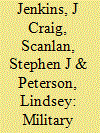|
|
|
Sort Order |
|
|
|
Items / Page
|
|
|
|
|
|
|
| Srl | Item |
| 1 |
ID:
079919


|
|
|
|
|
| Publication |
2007.
|
| Summary/Abstract |
Discussions of world hunger have focused on economic growth and international food aid, assuming that food supply is the critical issue. The authors show that food access rooted in social stratification and military power is the central problem. Synthesizing the entitlement and military famine approaches to hunger, the authors examine the effects of food supply, economic growth, social stratification, and military power on child hunger in less developed countries (1990-2000) using a cross-national analysis. Child hunger is largely due to gender stratification, militarization, and armed conflict. Halting wars, expanding political rights, and improving gender equity reduce child hunger. Economic growth and programmatic international food aid reduce child hunger, but there are no benefits from increased total food supply or international emergency relief. Child hunger is an access problem best addressed by expanding social and political rights, reducing armed conflict and militarization, and improving women's status. Early warning and relief efforts should focus on these concerns instead of the ``supply'' concerns traditionally emphasized
|
|
|
|
|
|
|
|
|
|
|
|
|
|
|
|
| 2 |
ID:
090101


|
|
|
|
|
| Publication |
2009.
|
| Summary/Abstract |
No one knows for sure how many North Koreans died as a result of the food shortages and related diseases in the 1990s, but estimates of premature deaths range from 220,000 to 3,500,000. The purpose of this paper is to study the political economy of North Korea with two goals in mind: the first is to explicate how and why the regime survived such a devastating famine; the second is to observe the normative implications that can be derived from understanding the regime, from an economic and ethical standpoint. Emphasis is not placed on building a generic model that attempts to identify the main causes of famine, but rather on drawing important insights from one of the greatest humanitarian tragedies of our time.
|
|
|
|
|
|
|
|
|
|
|
|
|
|
|
|
|
|
|
|
|